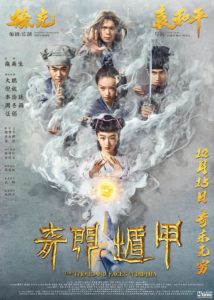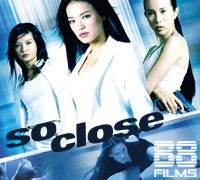
“Thousand Faces of Dunjia” Chinese Theatrical Poster
Director: Yuen Woo-ping
Writer: Tsui Hark
Cast: Da Peng, Ni Ni, Aarif Lee Chi-Ting, Zhou Dong-Yu, Wu Bai, Ada Liu Yan, Tiger Xu, Yang Yiwei, Mo Tse, Xu Ming-Hu, Sun Mingming, Zhang Yiqian
Running Time: 110 min.
By Paul Bramhall
In 2015 it was announced that master choreographer Yuen Woo-Ping would be teaming up with visionary auteur Tsui Hark to remake The Miracle Fighters, Woo-Ping’s madcap fantasy from 1982, that featured most of the Yuen Clan either in-front or behind the camera. Understandably, the reaction was mixed. Most of the charm of The Miracle Fighters came from the low-brow, but always creative, special effects, an element which many feared would be drowned out by CGI if it was to be remade for a modern audience. Then you have the collaboration itself. While both Woo-Ping and Hark are instantly recognizable names, both in Hong Kong cinema and the action genre overall, the fact is that the last time they worked with each other was on Black Mask 2: City of Masks. I’ll just leave that there.
While their previous collaboration saw Hark in the director’s chair and Woo-Ping on action choreography duties, when the remake finally hit screens in 2017, their roles were somewhat reversed. Going under the title The Thousand Faces of Dunjia, Woo-Ping maintains his director role from the original, while Hark is credited as writing and producing. Perhaps most tellingly though, it’s oddly Hark’s name that gets splattered across the screen during the opening of TTFOD (as I’ll refer to it from here on in), with Woo-Ping’s director credit receiving second billing. The reasoning behind this becomes increasingly clear as proceedings progress, as the influence of Hark is far more prominent than that of Woo-Ping. Those who felt Woo-Ping’s Crouching Tiger, Hidden Dragon: Sword of Destiny lacked his distinctive style, will likely feel it’s disappeared all-together in his latest directorial effort.
If anything, TTFOD feels like Hark is revisiting the world he created in his seminal Zu: Warriors from Magic Mountain, or more specifically, its more recent sequel The Legend of Zu. We have an embattled clan, called Wuyin, who have been defending the earth from aliens (because, you know, creatures from Chinese folklore are off the cards in today’s Mainland friendly climate), one of which has been kept prisoner in a heavily chained piece of rock within a mountain. The aliens are after a device called the Destroyer of Worlds, the only defence against which is to activate the Dunjia, a kind of astrological force which is believed to be dormant in a frail young girl (Zhou Dong-yu) with a unique birthmark on her arm, one which indicates her as the Wuyin clans destined leader.
When the imprisoned alien is set free by a red tentacled alien (you’re going to have to bear with me here), and events are further confounded by five power greedy clan heads activating the Destroyer of Worlds, the good guys realise they’ll need to fight back. The Wuyin clan, headed by Taiwanese rocker Wu Bai (the lead from Hark’s Time and Tide) and consisting of, amongst others, a fiery tempered Ni Ni (The Warriors Gate) and noble hearted Da Peng (Jian Bing Man), ultimately end up joined by a fresh-faced constable in the form of Aarif Lee (Kung Fu Yoga), essentially playing Yuen Biao’s character from Zu: Warriors from Magic Mountain. Can our heroes keep the constable safe, activate the Dunjia, convince their new leader to accept their destiny, fight the evil clan heads, stop the Destroyer of Worlds, and defeat the aliens!? Perhaps a more appropriate question to ask is, will you care? To which I can safely say, probably not.
Despite structuring itself into 6 chapters, TTFOD quickly turns into an unwieldy mess of a movie, with so much going on that audiences are likely to need a reminder of exactly what’s at stake more than once. It’s also guilty of being completely derivative of more recent (and more entertaining) blockbusters. The opening scene is practically identical to that of Stephen Chow’s Journey to the West: Conquering the Demons, as Aarif Lee attempts to chase down an oversized fish demon through a village. While I confess that it’s the first time to witness a rooftop chase sequence involving Lee, a three-eyed fish, and a sheet (don’t ask), it’s such a blatant rip-off that it’s impossible to enjoy. The chase is eventually interrupted by Ni Ni, who captures the demon and stomps the living daylights out of it, as Lee looks on, wide eyed at how Woo-Ping could so unashamedly cast her as an exact clone of Shu Qi’s character in Chow’s 2013 hit.
The biggest issue with TTFOD though is that it’s an eyesore. A garish, incredibly messy eyesore. What exactly the level of collaboration was between Woo-Ping and Hark would be interesting to understand, as the highly creative CGI action found in the latter’s Journey to the West: The Demons Strike Back and Detective Dee series, is here nowhere to be found. Instead, there’s an almost tireless bombardment of sub-par CGI bursting out of the screen every few moments. The main alien looks like a mix of a low budget 90’s PC fantasy game, and Sulley from Monsters, Inc. (not to mention its dialogue fails to match its mouth movements), characters frequently stare past the CGI rather than at it, and there wasn’t one scene when it felt integrated with its surroundings. Oh, and the hero of TTFOD is actually a gigantic fluorescent peacock thing which looks like it swallowed a bunch of glow sticks. I wish I was kidding.
In fact the only real trace of Woo-Ping could be said to come from the characters. The clan members appearances could well have seen them just walk off the set of the 1982 original, with hunchbacks, one-eyed warriors, buck-toothed swordsmen, and wild-haired bandits all populating TTFOD’s scenery. The evil clan heads also show traces of Woo-Ping’s influence, with names like the Eight Armed Ape and Lord of Hell, they resemble distant relatives of some of the Shaolin Drunkard cast. While the hark (pardon the pun) back to the period of Yuen Clan craziness was nice to see, they’re too often drowned out in the swathes of CGI nonsense that accompany the majority of scenes. In particular, the water effects are so bad they drew a wince out of me.
However with any Yuen Woo-Ping movie, there should be at least some saving grace in the form of the action. Here his fellow Yuen Clan luminaries Yuen Cheung-Yan (the director of Taoism Drunkard) and Yuen Shun-Yi are on action duties, and what little on display is sadly an embarrassment to their legacy. Indeed, apart from a brief showdown at the 80 minute mark, there is in-fact no action at all involving the cast themselves squaring off against each other. We get aliens flapping about and causing mildly engaging chaos, there’s plenty of jumping around, and there’s even some heroic posing, but actual choreographed action scenes? Forget it. Regardless of all the above criticisms, having practically zero choreographed action scenes, in a production with 3 members of the Yuen Clan at the helm, is TTFOD’s most heinous crime.
I can only guess that having 2 creative forces as stylistically distinctive as Woo-Ping and Hark come together, in this case resulted in them cancelling each other out. It wouldn’t be the first time. Sammo Hung and Ringo Lam came together for Touch and Go in 1991 with similar results, and who can forget Wong Jing and Jackie Chan’s differences on 1993’s City Hunter (though I have to confess, I kind of like that one). Sometimes when a filmmaker has such a defined style, mixing it with another filmmaker with a similar disposition doesn’t always create the dream results that everyone expects. This seems to very much be the case here, but still I can’t help but feel that if Hark was in the director’s chair, and Woo-Ping on action choreography duty, we would have at least got a slightly better end product than what we’re left with here.
With a surprising absence of humor (and what there is of it in Hark’s script, is painfully misinterpreted for the screen), zero characterisation, and one of the most anticlimactic cliff-hanger endings ever committed to film, TTFOD is a tragic waste of talent for all involved. 25 years later, we’re still waiting for a sequel to Jet Li’s Kung Fu Cult Master, hopefully in the case of Woo-Ping’s latest, we’ll have to wait even longer.
Paul Bramhall’s Rating: 2/10




2 out of 10? What’s wrong here??? I found it actually very enjoyable.
Yeah it was pretty bad. They should have made it more along the lines of Seven Swords. I think that was both Hark and Pings last good movie.
No love for Hark’s ‘Detective Dee’ series?
As for Woo-Ping, he didn’t have any involvement in ‘Seven Swords’. As a director, I’d say he lost his stride after 1996’s ‘Tai Chi II’, and never really got it back. Acting purely as an action director though, I thought he did a pretty stellar job on ‘Ip Man 3’.
Hm, I remember feeling like ‘True Legend’ was a lot of fun. I’m not willing to write off Yuen Woo-ping’s directorial career just yet; then again, I haven’t sat through ‘Thousand Faces of Dunjia’ yet!
Thanks for keeping me away from this flick. The trailer didn’t look that promising.
I’m wondering what the point was in having the Yuen Clan onboard if they weren’t going to do what they do best.
If you want solid CGI enhanced action, then Yuen Bun is your man. The work he’s been doing on Tsui Hark’s recent CGI driven 3D escapades has been outstanding.
I liked Flying Swords of Dragon Gate, and was lucky to see it in IMAX. Yuen Bun does seem to do well with those type of films. I just wish all CG martial art films were like that.
I wasn’t too fond of Detective Dee, and was apprehensive of checking out the others.
I’m hoping Woo Ping gets back whatever spark he had for True Legend.